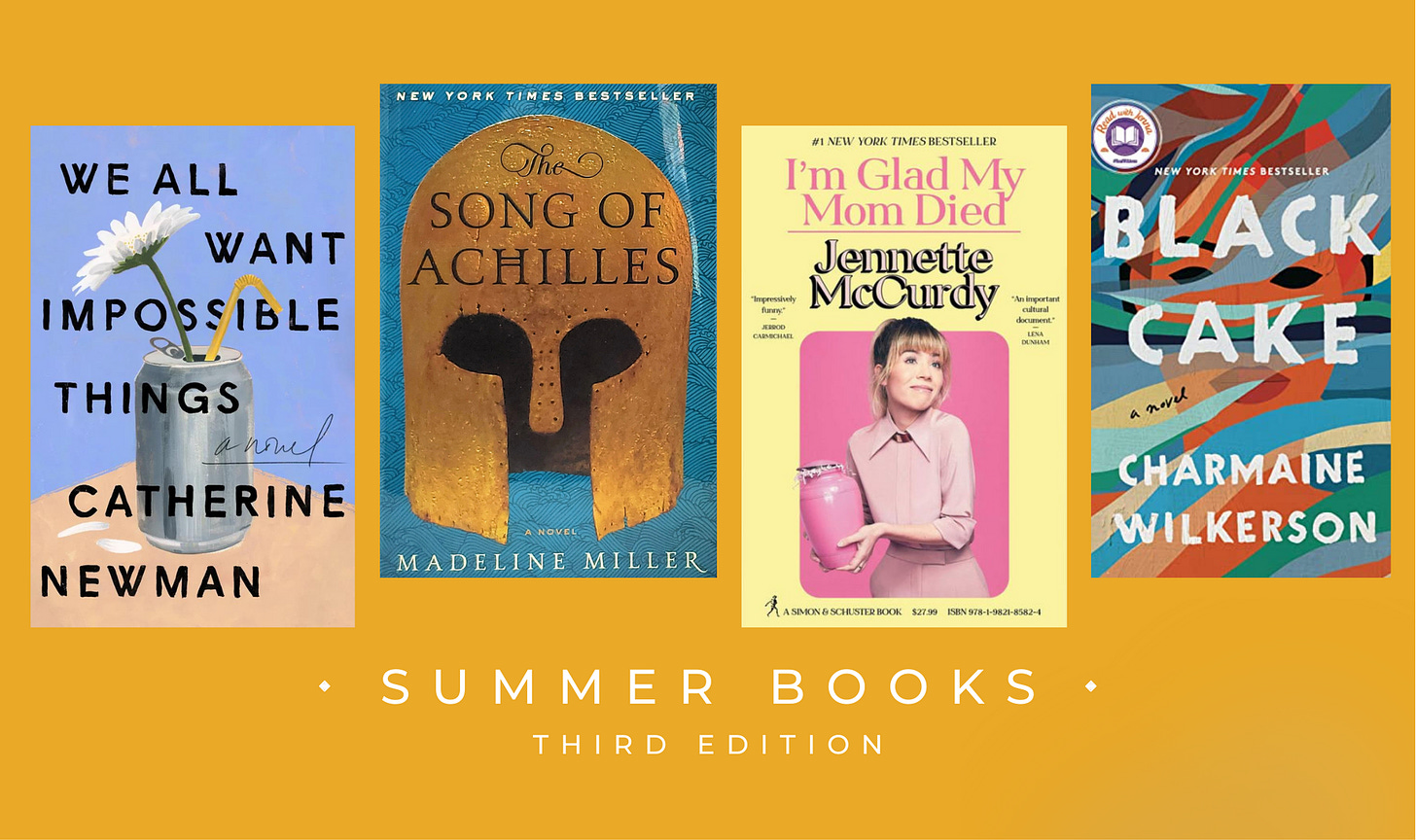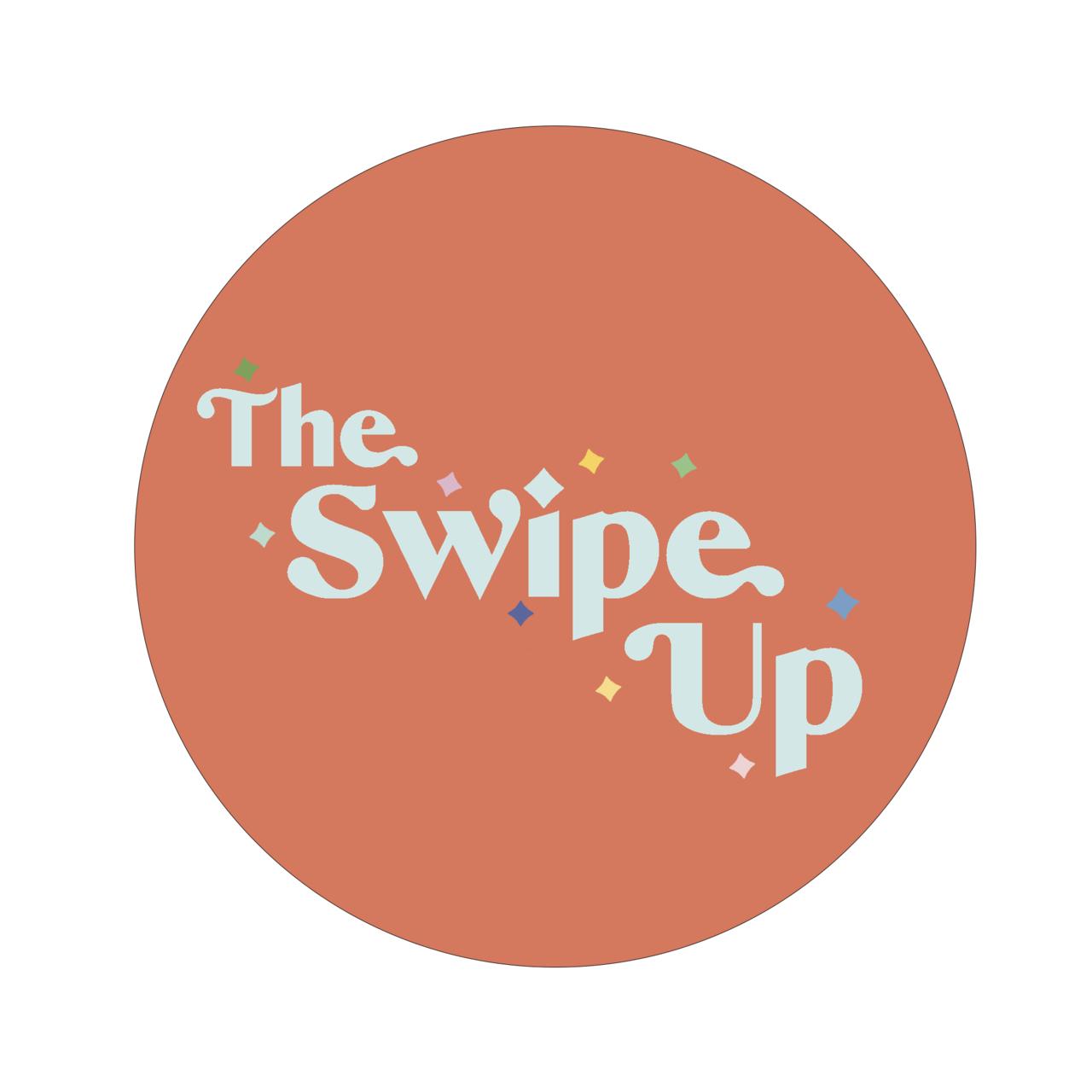Welcome to Worth It, a weekly(ish) round-up of the very best of what I’m reading, watching, listening to, and occasionally even cooking. Only the things absolutely worth your valuable minutes.
This Worth It is long! With a lot of italics and many adverbs!
It’s summer and I have no iPhone, which means you’re getting not just one book in every summer edition of Worth It—but four. In fact, so as not to compromise the integrity of my Canva graphic, I saved two books for next time.
(I swear I spend far more time wiping down countertops than reading novels, so I don’t know how this happens?! There are, apparently, many ten-minute increments in a day.)
Let’s get to it.
We All Want Impossible Things, Catherine Newman
I’m giving this one 5 stars. Or 10, if that’s the scale. Just—the most stars.
I cry-laughed at this book, or laugh-cried. Whichever is the thing when, at 9:30 pm, you are curled up in bed with your book, sobbing on top of your covers, and then you read a line and start laughing out loud until the sounds of laughing and crying become the same and you can’t be sure which you are doing anymore.
But how is this book funny? HOW? 1. The narrator’s best friend is dying of cancer. 2. The narrator’s marriage has fallen apart. 3. The narrator’s teenage daughter has pretty much quit high school. 4. The setting is literally hospice.
The whole thing should be tragic, but it just isn’t. It’s poignant and heartbreaking, yes, but so real and normal and weird and funny at the same time. In the middle of death, darkness, and a thousand kinds of loss, the relationships in the book—and the sentences describing them—are radiant.
Sometimes, a book makes me feel as though, if you read it and do not love it, we probably cannot be friends. Or like, we can be friends but the friendship will never fill up my heart all the way.
This is one of those books. The narrator of this book is like the shoulder-devil version of me, the me who wants to make inappropriate jokes and smoke cigarettes and not-so-gently steer every conversation toward the most important subject in the room, MYSELF. I suspect this kooky, self-deprecating narrator resembles the actual author of the book, which is why I would pay one million dollars to be friends with Catherine Newman. I would give up Diet Coke, chocolate chips, bacon, and sarcasm to be friends with Catherine Newman.
Except I believe in my heart that Catherine Newman wouldn’t want me to give up one single ounce of happiness to be her friend, hence my infatuation. (Here, by the way, is a photo tour of Catherine Newman’s house, which I saw long before I read this book, and which was the original reason I fell in love with her. The house tour went viral because her house is so radically1 lived-in. The woman left the boots by the door. Like, Judge me, I dare you.)
Pretty sure I’m going to start this book over from page one and read it again.
Song of Achilles, Madeline Miller
This book is so 100% polar opposite of the book above that it’s hard to believe the word “novel” can apply to both things. But! This is why we love novels, is it not? The novel is a generous thing.
While Newman’s book is a quirky meditation, this book is the very definition of archetypal STORY, with all the requisite high stakes and character development and plot twists, like a tale told around campfires for generations.
And, because Song of Achilles is an adaptation of Greek mythology, this tale has been told around campfires for generations. (Just not like this.)
Madeline Miller is a genius. You may remember Circe, which was everywhere a few years ago, and which I absolutely devoured. She wrote this one, Song of Achilles, first, and I’ve wanted to read it but never got around to it. Never got around to it, that is, until one long, hot, July day when our wifi went out, which means our televisions went out. The kids (quick reminder that I have four of them) all scattered from the sofa where they were watching tv, then re-settled on the sofa with their books. For the first time in… ever?… I didn’t have one. I didn’t have a book. From my janky phone, I texted my friend something like, “Emergncy. Hve book?” And she brought this one to [what had essentially become] my Little House on the Prairie. (I will give up bacon for this friend, also, if she ever asks.)
I digress. I devoured this book as quickly as I had Circe, and not just because I had no smartphone, no hotspot, no television, and was forced to churn my own butter for a couple of days.
I’m Glad My Mother Died, Jennette McCurdy
I’m still processing this memoir, which has gotten a toooon of hype. As a person who (mostly) understands the publishing industry, I knew the lion’s share of this hype was the work of the well-oiled, well-funded marketing machine at Simon & Schuster. But I bought the book anyway because—let’s face it—that title! (Kudos, pub team.)
The gist: a child star2 details her upbringing on Hollywood sets by an overbearing stage mother and a few creepy directors/creators. During the first half of the book, I was really impressed by the storytelling. (My expectations, admittedly, were low. I thought, “How well is the star of iCarly really going to be able to write?”3 ) The prose isn’t poetic, but McCurdy knows how to set a scene and write dialogue better than a lot of career writers.
Somewhere during the second half of the book, I got really tired. Tired of the voice or the story—or just weighed down by the darkness of various addictions. Some reviewers have said the book was whiny and entitled. I didn’t feel that way while I was reading it; I just felt kind of “over it.” A lot of people have loved this book, and I can see why, though I think it does get a little close to the navel-gazey kind of memoir that can start to wear on a reader after a while. The number one rule of memoir is that, underneath it all, the story can’t actually be about the writer; it has to be about other, bigger things. Mostly, this memoir is about the writer, but McCurdy has the celebrity boost to make her life in-and-of-itself interesting (and to make the reading experience a tad voyeuristic).
Black Cake, Charmaine Wilkerson
There’s a lot to love about this book: solid characters woven into an intergenerational story, really astute cultural commentary, some plot twists, a little intrigue.
The premise: When Benny and Byron’s mother dies, she leaves behind a tape. On it, she has recorded her life story, and her dying wish is for her children (estranged from one another) to listen to it… together. From the beginning, the mother’s hidden history is a shock both to her children and the reader, as the lives of various characters intersect in surprising ways. It’s an easy-to-read book that also asks really big questions about our inheritances, both the literal and the figurative ones.
Full disclosure: I was never racing to get back to this one. But I am apparently alone in this (see: Obama), and I liked it enough to recommend it anyway. I appreciated the reminder that people hold secrets (and hurts) we’ll never access understand. Even with the people we love the most, there are things we’ll live our whole lives not knowing.
(And so: grace.)
How to Let Go of the World, Franny Choi
This poem is too long to quote in full, so here’s just the beginning. Whew.
is smart and thoughtful and hilarious, and her Substack The Swipe Up never doesn’t4 make me laugh.There’s a documentary about climate change called How to Let Go of the World, and Sam asks, Should I jump off a building.
Among a growing list of promises I can’t make my friends: This weight will tether. You can come back up again. The faithfulness of gravity, of morning sounds. If only you’ll stay.
: : :
When I walk into the street it’s almost as if it’ll last: Smudge of a cooked orange pressed into the sky. The cars follow all their old lineages back and forth from shifts; meanwhile, three teenagers pile rollicking onto the sidewalk.
I don’t know how to do it: hold their faces in my hands and tell them what’s waiting. How to teach any of us to follow this song, into what dark.
: : :
One evening, I turned a corner and panicked at a sudden flash in my rearview, teeth chattering into my highest throat. Every nerve prepared for the acrid drip of cop talk until I realized: it was no cruiser. It was the sky. The sky, shocked with dying.
But, full disclosure: Her newsletter is also a little bit about Christianity. Sorry, but name one idea, establishment, or domain more in need of a humor infusion than Christianity in 2023. 2023 Christians are very angry! very serious!
It’s okay to laugh some, you guys.
[Side note: I’ve started 17 posts about God for this Substack and never posted them. Turns out God is hard to summarize?! Anyway, if this Christian-adjacent recommendation is confusing to you, more to come. Probably. When I am braver.]
My podcast ingestion is waaaay down without an iPhone, but I’ve managed to listen to a couple. I have long loved Miroslav Volf (professor of Theology at Yale Divinity), so I hunted this one down. In it, Kate and Miro (yeah, I gave him a nickname, just now) ask the question What makes a good life?
It’s my favorite question.
From the transcript, lightly edited for clarity:
German sociologist Hartmut Rosa speaks of a painter. And life is like the work of a painter. But of course, every painter has to have tools of the art of the craft. So a painter might start obsessing with different tools that the painter has—whether that’s brushes, whether that’s a kind of other furniture, furniture in the studio, whatever that might be, and obsesses so much thinking that once he or she has that nailed, then they could start painting.
And it’s all concentrated on means to life rather than really pursuing the end of life. The goal of life, namely in this particular case, painting. And I think we find ourselves often in a situation of this sort, we pursue means and means slowly become ends and they swallow the other ends, more important ends, and suddenly we find ourselves obsessing about what is it that we are obsessing.
We want to have really nice means, nice tools. Yeah. But a lousy life.
“Life is messy. I certainly don’t expect tidiness from yours or anybody else’s.”5
—Catherine Newman
[eye roll]
(from iCarly, a Nickelodeon show that was just behind my time)
I kind of don’t like it when people who are very good at other things can also just, incidentally, write well. Is that bad?
Yes I know the rule. I do not not love a good double negative.
Can you imagine any dying thought sadder than this one?: Well, didn’t I live a tidy life.
Give me wild, give me uncertain, give me confusing, give me scary. Give me foolish.
Give me anything but tidy.















After I read this the other day, I immediately went to my Libby app to put We All Want Impossible Things on hold- but it was already available. So exciting. I finished it last night- wow. Great recommendation. Thank you! This is also going to push me to finally read Song of Achilles, once I get through a few other on my list. (Loved Circe.)